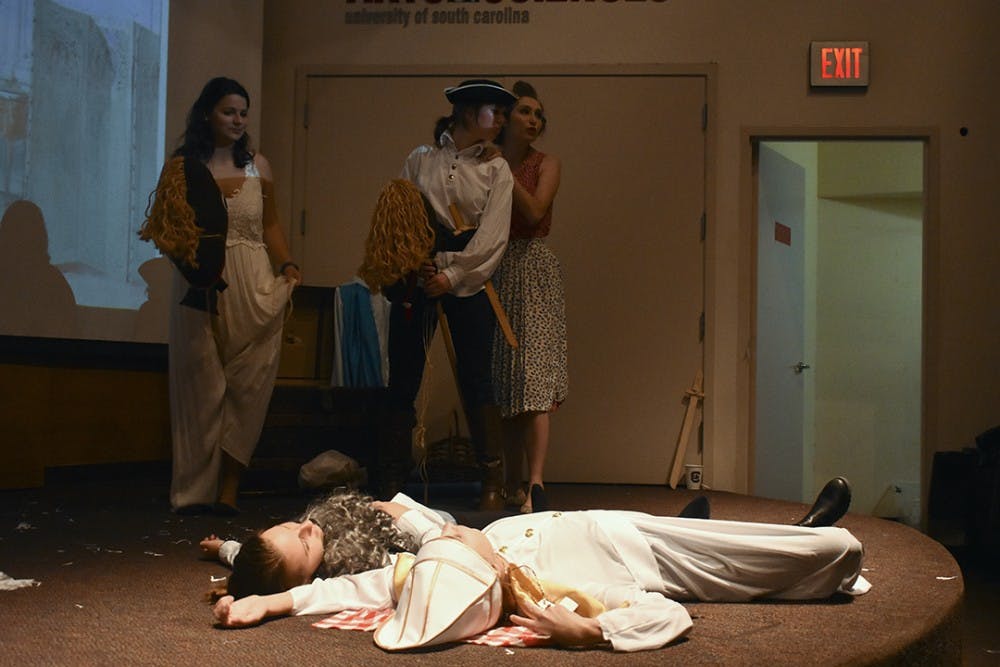We read about Voltaire in our European history classes, but very rarely do we see the 18th century plays by the French Enlightenment writer performed in 21st century America.
However, that's what professor Jeff Persels' French 330 class focused on all semester, working on the play "Candide, ou l'optimisme!" French 330, The French Theatre Experience, is a class composed of 14 undergraduate students and is unique to USC in that it has been taught since the 1970s and produces a play entirely in French every spring. The students performed Wednesday night in Gambrell auditorium and will have another show on Friday.
"Candide, ou l'optimisme!" is a play about Candide, a young and innocent man who is traveling around the world and undergoes all sorts of misfortunes. Nevertheless, Candide perseveres, thanks to his mentor Pangloss who thinks "everything is for the best" even though terrible things keep happening to him. Voltaire thinks this theory of optimism is outrageous, so "Candide, ou l'optimisme!" is a satire that critiques this theory.
“His whole point is that, rather than speculate metaphysically about whether there’s good and evil in the world, ... we should just work to make it better," Persels said. "So the whole theme is the catchphrase ... ‘we’ve got to cultivate our garden.’”
The star of the show,was portrayed by Sophie Curry, a first-year civil engineering student. Curry spent the first few years of her life in Paris. She loves the culture, but says her current French is "rusty." Curry, along with other students in the class, faced the challenge of performing a play entirely in a foreign language.
“It also made me more comfortable speaking French ... at first every time I would have to speak French to someone I was like ‘Oh, no I’m probably speaking badly, I should just stop,’" Curry said. "But now, since every day I have to speak French in front of people, it helps make it more comfortable with it, which is important.”
Persels also discussed the challenges of performing a play in a different language. According to Persels, it is more difficult to recover from forgetting a line than it would be if the text was in the students' native language. However, they did have a native speaking assistant sitting in the front row of the auditorium to act as a prompter in case any lines were forgotten.
Aside from language, Persels touched on the fact that a majority of the students had no theatrical training.
"It’s not like working in the theater department where you’ve got people who want to be actors … half the time this is the only time they’ll ever be on stage in their lives," Persels said. "They want to do it, but they don’t come with any background, so that’s a challenge.”
Elayne Bauer , a fourth-year international business and marketing management student, played "La Vieille," which means "the old lady." Bauer had taken a French film course previously, so she thought a French theater course would be a good, relatively similar academic experience.
“At first I thought we were going to be studying about French theater. I didn’t realize we were putting on a play," Bauer said. "But when I found that out I thought, 'Even better.'”
Bauer discussed how their adaptation of "Candide, ou l'optimisme!" focused on the comedic aspects of the text and looked forward to her friends coming out to see their adaptation.
Part of the adaptation is that the play is significantly condensed, but they also took some creative liberty with certain scenes. One element of the story Persels' class altered was the El Dorado scene. Voltaire crafts El Dorado as kind of paradise on earth. The class' interpretation gave El Dorado a "hippie" theme, with the queen even smoking a JUUL on stage.
The main thing Persels wanted his students to gain from his class and performing in the play was the pronunciation and rhythm. These two aspects of a language are not always included in foreign language classes, but is often a vital aspect of communication when communicating with native speakers. Persels believes that by memorizing their lines, his students were able to pick up on these more elusive patterns in the language.
“My theory has always been that ... you can learn vocabulary ... you can interact with people, but the rhythm of the language is very difficult to pick up,” Persels said.
Fourth-year international business and finance student Andrew Schindler portrayed Pangloss in the show. Schindler struggled with some of the pronunciation and said that some of his outside sessions with Persels and another French department assistant helped him out a lot. Another challenge he faced was that due to the play's satirical nature, metaphorical language is used which can be difficult to comprehend at first in a different language.
Schindler mentioned that the use of action-based communication was definitely helpful for audience members who might not be French speakers.
Even the audience members who did not speak French were able to enjoy the show due to multimedia used throughout as well as an English synopsis in the program. Schindler described how seeing the play had a positive cultural impact on viewers.
“We’re doing Voltaire ... How wild is that, right?" Schindler said. "I did not expect to be doing Voltaire when I came to South Carolina.”
And Persels agrees, explaining how they're "bringing an important text" with an "important message" to the audience.
“You really see that there’s a whole cultural life in another language that sort of legitimizes it as a means of expression.”

